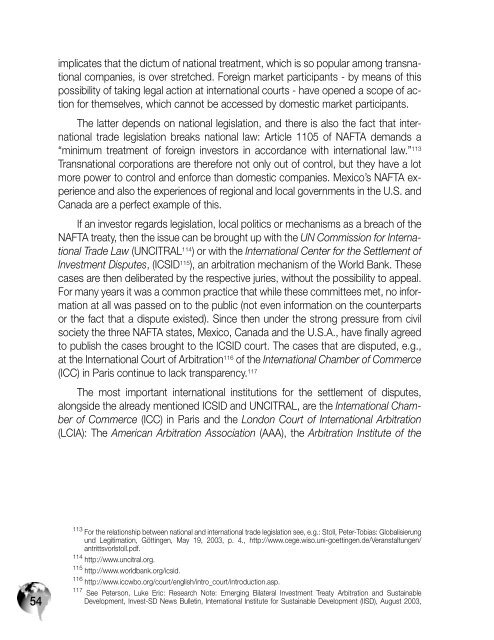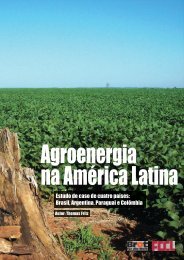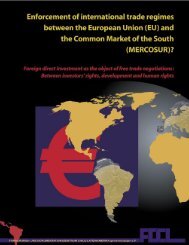Download - FDCL
Download - FDCL
Download - FDCL
Create successful ePaper yourself
Turn your PDF publications into a flip-book with our unique Google optimized e-Paper software.
54<br />
implicates that the dictum of national treatment, which is so popular among transnational<br />
companies, is over stretched. Foreign market participants - by means of this<br />
possibility of taking legal action at international courts - have opened a scope of action<br />
for themselves, which cannot be accessed by domestic market participants.<br />
The latter depends on national legislation, and there is also the fact that international<br />
trade legislation breaks national law: Article 1105 of NAFTA demands a<br />
“minimum treatment of foreign investors in accordance with international law.” 113<br />
Transnational corporations are therefore not only out of control, but they have a lot<br />
more power to control and enforce than domestic companies. Mexico’s NAFTA experience<br />
and also the experiences of regional and local governments in the U.S. and<br />
Canada are a perfect example of this.<br />
If an investor regards legislation, local politics or mechanisms as a breach of the<br />
NAFTA treaty, then the issue can be brought up with the UN Commission for International<br />
Trade Law (UNCITRAL 114 ) or with the International Center for the Settlement of<br />
Investment Disputes, (ICSID 115 ), an arbitration mechanism of the World Bank. These<br />
cases are then deliberated by the respective juries, without the possibility to appeal.<br />
For many years it was a common practice that while these committees met, no information<br />
at all was passed on to the public (not even information on the counterparts<br />
or the fact that a dispute existed). Since then under the strong pressure from civil<br />
society the three NAFTA states, Mexico, Canada and the U.S.A., have finally agreed<br />
to publish the cases brought to the ICSID court. The cases that are disputed, e.g.,<br />
at the International Court of Arbitration 116 of the International Chamber of Commerce<br />
(ICC) in Paris continue to lack transparency. 117<br />
The most important international institutions for the settlement of disputes,<br />
alongside the already mentioned ICSID and UNCITRAL, are the International Chamber<br />
of Commerce (ICC) in Paris and the London Court of International Arbitration<br />
(LCIA): The American Arbitration Association (AAA), the Arbitration Institute of the<br />
113<br />
For the relationship between national and international trade legislation see, e.g.: Stoll, Peter-Tobias: Globalisierung<br />
und Legitimation, Göttingen, May 19, 2003, p. 4., http://www.cege.wiso.uni-goettingen.de/Veranstaltungen/<br />
antrittsvorlstoll.pdf.<br />
114<br />
http://www.uncitral.org.<br />
115<br />
http://www.worldbank.org/icsid.<br />
116<br />
http://www.iccwbo.org/court/english/intro_court/introduction.asp.<br />
117<br />
See Peterson, Luke Eric: Research Note: Emerging Bilateral Investment Treaty Arbitration and Sustainable<br />
Development, Invest-SD News Bulletin, International Institute for Sustainable Development (IISD), August 2003,









